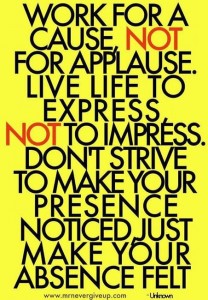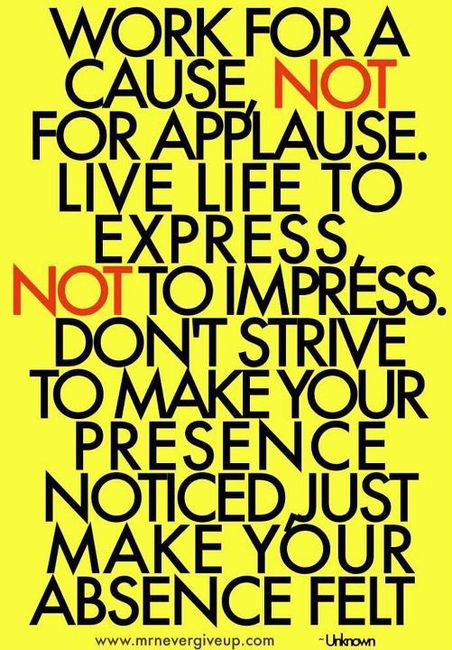He has now stood up at the long table, perhaps hoping that the argument can be won by positioning himself above those with whom he is supposedly vehemently disagreeing.
About what? I’m unsure, as is the normally reserved and quiet junior staff person, who has uncharacteristically burst out laughing at the scene before her.
Her and I both know that what’s being discussed has less to do with the issue at hand, and more to do with these men’s need to be on top.
I recently read that industrial psychologists debuted a Workplace Arrogance Scale to identify problem managers. I thought, had this been in use in this meeting, it would have been off the scale.
It’s not aid agency politics at play at this table. It’s egos.
***
Egos are tricky things for aid workers, grantmakers, social entrepreneurs and all international do-gooders. Looking at a problem like malaria or poverty and saying, “Gee, I think I could help make a difference here,” requires our egos to be involved. (Why, starting a blog may be the most ego-driven act of all! And that is why I’ll be referring to “our egos” here.)
As soon as our work becomes all about us though, it can suffer. It will be less responsive to others’ needs and risks being inconsequential in the everyday lives of those people we aim to serve. Here’s three ways an unchecked ego can trip us up, as well as suggestions for how to prevent this.
1. Our ego insulates us.
A function of our ego within our consciousness is to protect ourselves from emotional harm, which is why it’s not necessarily a bad thing. But this instinct to protect can narrow our perspective and leave us less open to listening and learning from others. A person driven by ego can push a mother’s health initiative forward come hell or high water, or can high-mindedly question everything about “what works” in poverty alleviation. But the ego rarely, if ever, encourages us to question ourselves.
One of my oldest and dearest friends once told me that my commitment to making a point, whether it’s fully vetted or not, it my most endearing and frustrating trait. This is why it’s vital for us to have a trusted network of peers (perhaps most importantly with those outside of our organization or initiative), who can say to you frankly, “Hey, shut it. There may be another viewpoint you are not seeing.”
 2. Our ego alienates other people.
2. Our ego alienates other people.
Our ego does indeed matter if it makes people feel that they don’t count. Do I even remember what the disagreement was about in the story above? No I don’t. What I remember is how insignificant and frustrated the rest of us witnessing the battle of egos felt.
To prevent this, we must consistently (and sincerely!) solicit feedback from those we’re working with and for, and sooner rather than later. We also must know that if it’s truthful, hearing people’s perspectives may sometimes hurt our feelings. Our challenge is not to dismiss it outright, but let it inform us going forward.
3. Our ego can shut down dialogue.
Throughout my years in international aid, I’ve been involved in lots and lots and lots (!) of discussions. However, there is a big difference between discussion and dialogue where us do-gooders are concerned. A discussion is an exchange of words and ideas. But in a dialogue, people come to the table willing to create new understandings. They are willing to be changed by the experience and an unchecked ego can obviously inhibit this from occurring.
If you want to differentiate between a discussion and a dialogue, pay attention to who is talking. If no one is telling you “no” or if someone has the answer to everything, that’s a clue you’re probably not participating in a meaningful dialogue. As do-gooders, it’s vital to seek out opportunities to find people who will disagree with you. Make friends with them, as I’m hoping to do during this week’s Opportunity Collaboration in Mexico. This is even more important the more power and access to resources a person has.
The bottom line is that our egos can get in the way of how other people see us, and whether and how they are willing to work with us. Author Richard Rohr says, “It is almost impossible to give your life warmly for an idea, a force, an energy, or a concept. We are programmed to give our lives away to other persons.”
In other words, if people don’t want to work with us, even if because of circumstances in which they have to, it’s a problem if we’re trying to change the world.
Heroes ought to be removed, in a world where the most beautiful remains to be done. ~Daniel Balavoin
***
Related Posts
A new kind of aid donor: Four things they do differently
Site Visits: The Feedback You’ve Never Heard
The westernized nature of the #socent industry
Sorry but it’s not YOUR project


We are all ego-driven and want our presence to be noticed. Denial of this is for me what creates problems: projections, arrogance (in denial, that is passive aggressiveness), patronising ‘helping’/”serving’ dynamics, power-driven attitudes covered up as doing good, envy, etc.
Better to be out and loud about our big egos. I always appreciate people who a admit that they want to be seen, noticed, recognised and expect applause. It’s an honest attitude.
Awareness of being ego-driven is a good start. But how about the big ego that often comes with being aware that I have a big ego?
Hope you are well dear Jennifer and thanks for this thought-provoking post! Love, A.
Great post as always! Glad to have you back 🙂
Thanks for this, Jennifer-especially the ‘WA’ scale. One of the problems , in my experience (in about a billion different types of mtgs. with different people around the world)is the lack of true consultation skills and experience as a preparation for both leadership and problem-solving, in or outside the aid community. Yes,the ego is ever-present, but the absence of consultation principles is glaring. Whe such skills are learned and practiced by groups over time, I have seen miracles!
I’ve found it interesting when colleagues coming from the private or public sectors have commented that ego seems to be a bigger problem in the non-profit sector.
I think the nature of the non-profit sector can make ego a particular problem – everyone comes in with the best intentions and a real personal commitment to the cause and the work. That means when critiquing or providing feedback on someone’s project or idea, it can be perceived as not just a professional critique, but indeed a personal critique as we care about the work so much. So egos can be easily bruised!
Jennifer. Nice post. Of course this is about egos and not agency politics. But don’t you think that agency egos come into play? Organizational arrogance? Seems to me there are organizations whose very identity is constructed around making its voice heard, rather than listening to or consulting with others.
First hand experience tells me that self-righteousness in an NGO can translate into a lot of ego in the manager.
Thanks for this striking post. It’s good to be confronted with issues that make you squirm a bit. I really like your distinction between discussion and dialogue – I wish that was more widespread. It reminds me of Frances Fox Piven’s ideas of interdependent power: there is power in social relations. When you build collaboration out of constructive disagreements, there is enormous potential there.
Quite agree. More on this subject from Terence (http://waylaiddialectic.wordpress.com/2012/07/10/if-not-the-road-to-hell-then-at-least-the-road-to-nowhere/) and self (http://bottomupthinking.wordpress.com/2012/07/10/the-need-for-self-doubt/).
“If no one is telling you “no” or if someone has the answer to everything, that’s a clue you’re probably not participating in a meaningful dialogue…”
So, so true. Alas, so much of the development process seems mired in non-meaningful dialogues. I would say that dialogues take place because they’re easy to verify (“was a stakeholder meeting held?”), but the meaningfulness of such dialogues is much harder to quantify or verify and, therefore, is harder to incentivize. This is a really critical problem in development practice.
Pingback: Egotism, altruism and escapism in aid work – culture and care